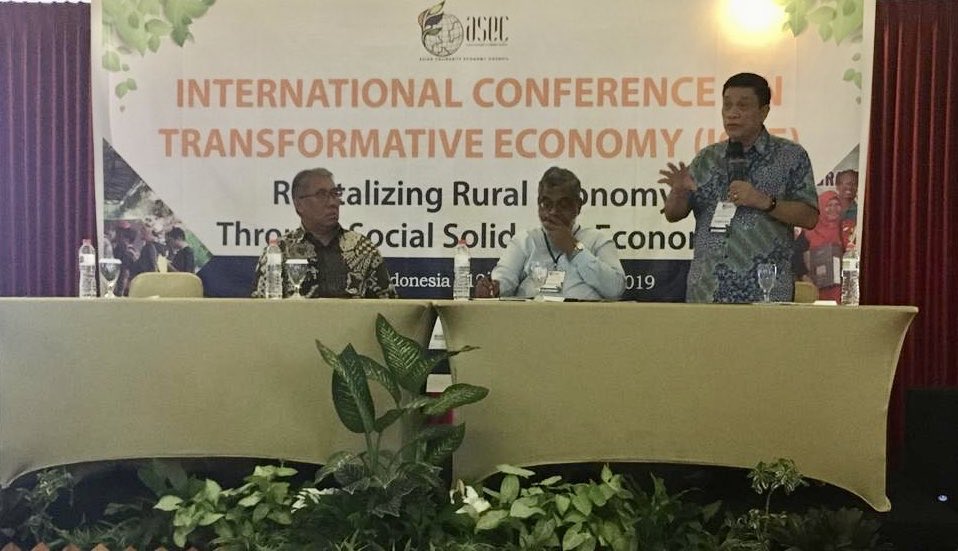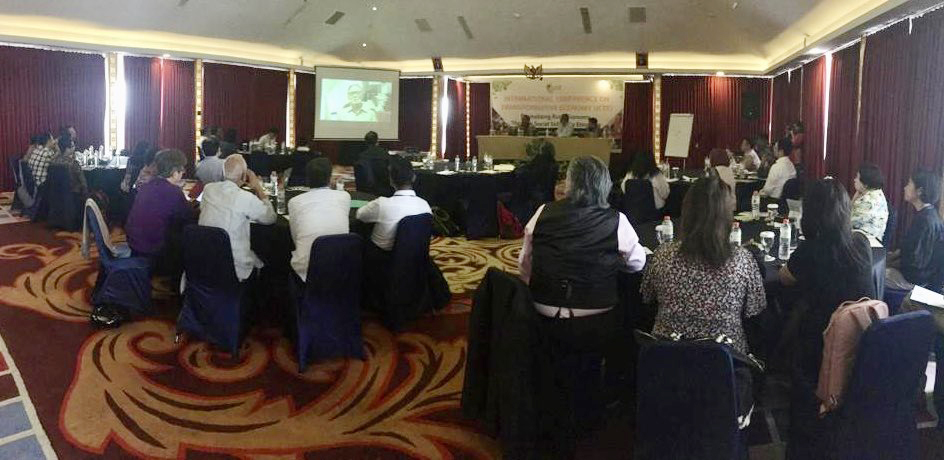This conference aimed to discuss the role of the transformative economy in revitalizing the rural economy through the Sustainable Development Goals (SDGs).
Written by Prof Datuk Dr Denison Jayasooria, Chair, Asian Solidarity Economy Council (ASEC – RIPESS Asia)
The Asian Solidarity Economy Council (ASEC – RIPESS Asia) hosted a two day International conference on Transformative Economy in Yogyakarta, Indonesia on Nov 12 & 13, 2019. The Conference was attended by 40 participants from eight Asian Countries namely South East Asia – Philippines, Thailand, Indonesia & Malaysia; from South Asia from India and Sri Lanka and from East Asia from Hong Kong, China and South Korea. There were also participants from Spain and Geneva.
The theme of this Conference was Revitalising Rural Economy through Social Solidarity Economy. Among ASEC partners it was felt that one of the major challenges in Asia is poverty and rising inequality. We observed that rural urban migration and urbanization expanding into rural areas impacting negatively local grassroots communities.
 This conference was organised to draw lessons from grassroots community based initiatives within Asia which are undertaking alternative economic models from the ground upwards by community based initiatives as well as civil society led community projects.
This conference was organised to draw lessons from grassroots community based initiatives within Asia which are undertaking alternative economic models from the ground upwards by community based initiatives as well as civil society led community projects.
We also felt that the findings of this International Conference could serve as input to the World Social Forum on Transformative Economies to be held in June 2020 at Barcelona in Spain as input from the Asian region.
Learning tour
During the two day conference we had opportunities to visit grassroots community based initiatives in Yogyakarta on Day One and on Day two we devoted time hearing ten case studies from eight Asian countries. There was opportunities to review and reflect from the Social Solidarity Economy (SSE) Framework developed by Dr Ben Quinones namely Responsible Governance, Edifying ethnical values, people centred development, economic and environmental sustainability.
From Indonesia we saw how a whole village reorganised themselves to provide community based economic opportunities and job creation through waste management project, traditional medicine production and running a traditional family based restaurant, from Malaysia & Thailand we reflected about organic farms run by indigenous forest based communities & rural communities, from Philippines we drew lessons on gender issues & Cooperative model, from China and Indian examples of rural revitalisation, from Sri Lanka skills training and employment creation projects in the rural communities.
The stories from Sarva Seva Farms (ASSEFA), India and Sarvaday movement, Sri Lanka impacting a very large outreach of villages is another example of the size and impact of the alternative economy of people working in cooperation & solidarity, to improve their daily lives.
Findings

Arising out of these discussions including reflecting from local to global, we identified a number of key pointers which will enabled us to distinguish unique developments form the grassroots.
First, we noted that from the Asian context various terms were being used to define and identify social solidarity economy. A term emerging from Indonesia was compassionate economy which was contrasted with competitive economy. In the Philippines context the term was Bayanihan which means cooperative helping one another or in the Malay term Gotong Royong. What is noted is the spirit of solidarity in supporting each other to prosper and ensure that all in the community has social wellbeing.
Second, we recognised that local leadership is central to the success of local projects. We heard real life experiences from Pak Wahyudi and his work at Kampong Mataraman and how his visionary and inclusive leadership model has facilitated a transparent and accountable local village administration. Through their communities economic projects they have provided job opportunities at the local level which is sustainable and operating on SSE principle.
Thirdly, we recognised a major factor for ground success and sustainability is the team building and solidarity among the workers and local community. We heard the management challenges faced by Ms Nurul at Kamong Mataraman in building an effective team of 48 full time workers from the local community. In all the local projects visited as well as from the case studies we recognise that women play a major role in socio economic empowerment of local communities. They are asset and therefore more needs to be done to address gender based discrimination & violence which continues to dominate most rural and traditional societies.
Four, we recognise that in all the community led programs job creation is a key aspect. Often the markets devalues labour but these community projects including waste collection bring a sense of new dignity to work as it is viewed as recycling. Workers are treated as partners and there is transparency of the financial records. There is profit sharing. The employer-employee relationship is changed to one as co-owners and custodians of the project.
Five, we recognised the need for good documentation of grassroots experiences as well as qualify the success, achievements with good documentation in building an alternative narrative. In the context methodology, strategies for scaling up, impact assessment is important. Write up which is both quantitative and qualitative is important to capture the potential of grassroots community based economic activities.
 For those of us attending this Yogyakarta, International Conference, we experienced the sense of community solidarity, being inspired by the success and achievements from the ground from so many different countries.
For those of us attending this Yogyakarta, International Conference, we experienced the sense of community solidarity, being inspired by the success and achievements from the ground from so many different countries.
However, we note that there are many challenges ahead. From these alternative models whether we call them compassionate or transformative or solidarity economy we do recognise that a change from the grassroots is real and its making an impact for a revolution in economy towards a more sustainable one which fosters greater equality of opportunities and outcomes. It is an economy which is inclusive and which will not leave any one behind.





Leave A Comment